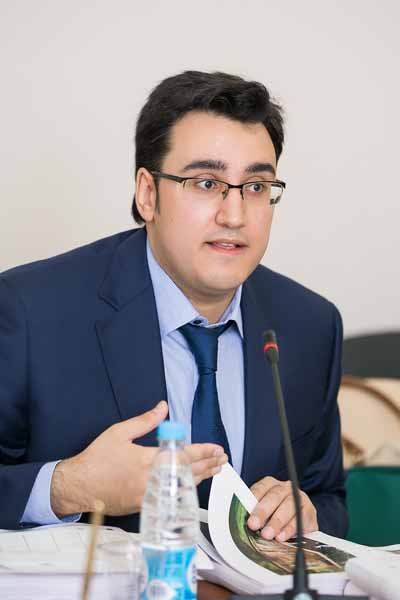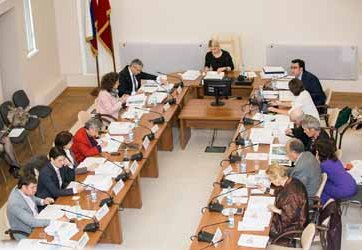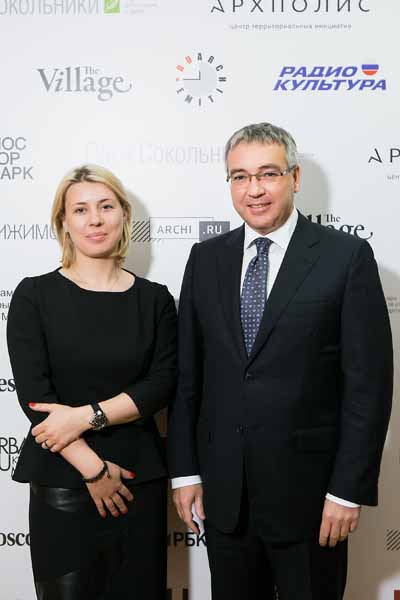Submitted by WA Contents
A list of the first stage of Sokolniki Competition finalists has been formed
United Kingdom Architecture News - Jul 03, 2014 - 12:46 4095 views
Following the meeting of the jury held on June 27 in Moscow Culture Department, 10 bureaus from Russia, China, Great Britain, Netherlands, France and Spain were invited to take part in the second stage:
- Turenscape (China, Beijing);
- Ove Arup & Partners (Great Britain, London);
- DEBARRE DUPLANTIERS ASSOCIES (France, Paris);
- MLA+ B.V. (Netherlands, Rotterdam);
- WOW HAUS (Russia, Moscow);
- RUBIO ARQUITECTURA (Spain, Madrid);
- OKRA (Netherlands, Utrecht);
- ilex Paysages & Urbanism (France, Paris);
- Cruz y Ortiz arquitectos (Spain, Seville);
- LOLA landscape architects (Netherlands, Rotterdam).
The jury accepted 66 applications for consideration, 38 of which were received from foreign participants: from Spain, France, Great Britain, USA, Italy, Ukraine, Latvia, Mexico, China, Slovenia, Turkey, and 28 applications have been sent from different Russian cities.
The places of finalists were distributed in accordance with the rating executed by the Competition jury on the basis of the studied portfolios and essays provided by competitors.

Andrey Lapshin, Director of Sokolniki Park that was present at the meeting of the jury, emphasized that Sokolniki Park has a rich history, so it is important to preserve the existing traditions considering understanding of the park environment, its landscape and climatic conditions. Global changes will be painful for the park, so the task is to develop the park concept by calculating the right balance between the environmental, economic, social and cultural components of the park’s further development.

Marina Lyulchuk, Director of Mosgorpark, said about the idea of the competition Sokolniki Park is one of the oldest and the most important rest places in Moscow, it has rich content and potential. We do not set the task of increasing the number of Sokolniki Park visitors, our aim is to redistribute the flows. Today the main load is concentrated in the central part of the park, and we want the competitors to put forward the ideas related to optimal territory zoning and its rational use. The terms of reference for the participants emphasized that the park does not need reconstruction, it needs development”.

Sergei Georgievsky, Archpolis partner, Head of the Competition Organizing Committee, said: “Special attention in the participants’ works was paid not only to realized projects but, first of all, to the vision of the park’s problems and specific nature, offered urbanistic solutions to strengthen the connection between the city and the park, as well as the ideas related to park integration into the everyday city life”.
.jpg?1404322284)
International Jury of competition
Elena Gonsalez, an architectural critic, noted that “parks are now seen as the places for rest and entertainment, the initial sense of the park as a territory is lost. Sokolniki Park is a special place where the interactive part is concentrated at the main entrance and the major part of the area is occupied by woodland”.
Gabriele Filippini, architect and head of Studio Arch Gabriele Filippini sees the future of Sokolniki Park as a part of the large single green system of the city: “Moscow is like Venice for me, but instead of water there is a different link in Moscow, the natural verdure of parks, squares, forests, while in European capitals the natural environment is usually brought to the city in an artificial way. Moscow should be united by joining green territories, so that you could get from park to park without going through industrial regions and close city development, so that the citizens would find it easy and comfortable to move between isles of verdure. In the context of this idea, Sokolniki Park plays a huge role for the capital as it is even now connected with other green zones, which makes its environmental component more valuable and the development of cultural and economic components – more promising”.
Evgeny Ass, Dean of MARCH School of Architecture, added that Sokolniki has unique layout, its development should only rely on the existing historical foundations. Holding an international Competition will help the park to find new interesting solutions and acquire experience of integration into an international architectural context. The Competition was as open as possible for the participation of foreign specialists in the field of architecture and landscape, which is proved by the short-listed candidates. Nine foreign bureaus and only one Russian bureau have been selected for the second stage”.
The competition jury, presided by Sergey Kapkov, Minister of Moscow Government, Head of Moscow Culture Department, is composed of 12 experts in the sphere of architecture, city development, landscape and park zones development. Deputy Chairpersons of the jury included Marina Lyulchuk, Director of Mosgorpark , and Olga Gritsan, Head of Park Technologies Development Department, Mosgorpark. The jury is also composed of: Chief Executive Officer of the International Federation of Directorates of Parks and Rest Places, Digby Whyte (Australia), Dean of MARSH Architectural School Evgeny Ass, architecture critic Elena Gonsalez, Deputy Head of Moscow Department of Natural Resource Use and Environmental Protection Yulia Kudryashova, President of the Association of Landscape Architects of Russia, Chief Landscape Architect for Empire Architects & Interior Designers Taisia Wolftrub, Architect and Head of Studio Arch Gabriele Filippini Gabriele Filippini (Italy), as well as the founder and Creative Director of Lieu Commun agency Muriel Russeau-Ovchinnikov (France), Head of Scientific Research Association Regulation of urban development on the historical areas and areas of protection zones of cultural heritage of the State Unitary Enterprise (GUP) Research and Design Institute General Plan of Moscow Elena Solovyeva, Director of Journey Event Agency Evgenia Galetka and Natalia Matveeva, Head of the monuments sector of garden art of the Directorate of Special Cultural Heritage Objects Preservation of Moscow Cultural Heritage Department.
Organiser of the competition
ArchPolis Centre for Territorial Initiatives – The ArchPolis Centre for Territorial Initiatives is responsible for managing the Nikola-Lenivets Project (a park for the arts covering 650 ha). The Centre’s research and development work focuses primarily on public space, including a pedestrian zone in the City of Zaraysk, the design concept for a park of historical reconstructions developed by RDI in New Moscow, a pilot “Landscape School” for the Sparrow Hills Nature Reserve in Moscow, and the design concept for Maslenitsa celebrations in Moscow’s Gorky Park. In 2003, ArchPolis launched New Leaders in Territorial Development, an education programme that integrates urbanism, architecture, economics and social sciences. Experience developing public space — especially green space — along with organising and implementing open events has provided valuable preparation for carrying out the Sokolniki Park competition.
Partners
The competition is supported by the City of Moscow Department of Culture and the City of Moscow Agency for Parks and Recreation (Mosgorpark).
Information services are provided by the public relations agency Rules of Communication.
About Sokolniki
Sokolniki Park of Culture and Rest is the largest park in Moscow, with a total area of 515.7 hectares. The territory's development into a place of recreation can be traced to the 15th century, when it served as a site for royal falcon hunting. Under Peter the Great it hosted mock battles and folk festivals for nobles and commoners alike. During the 19th century, the park was officially established and equipped with an iconic design that has survived to the present day: seven radial glades extending from the “Circle” to a curved glade that connects their endpoints. Sokolniki Park became one of the most popular areas for summer cottages, many of which were inhabited by musicians, writers and other artists. During the Soviet era, it acquired new landscapes — such as the Large and Small Rose Gardens — along with many other attractions, including verandas for dance, concert stages, libraries with reading rooms, athletic facilities and an exhibition hall. In 1979 it became a protected monument of garden-park design from the 17th through 19th centuries, which substantially limited further transformation. Tracing the park’s evolution reveals its important role in the history of Moscow and of Russia as a whole. Distinct periods in its development are marked by dynamically reconfigured identities of epochal significance. Sokolniki continues to evolve in a manner that reflects important characteristics and values of our time. Conceptual frameworks developed through the present competition should offer compelling visions of what the contemporary park could become.
> via conceptsokolniki.com
